北师大版(2019)选择性必修第三册Unit 7 Careers Lesson 3 Meet the New Boss: You课件(共38张PPT)
文档属性
| 名称 | 北师大版(2019)选择性必修第三册Unit 7 Careers Lesson 3 Meet the New Boss: You课件(共38张PPT) |

|
|
| 格式 | pptx | ||
| 文件大小 | 2.8MB | ||
| 资源类型 | 教案 | ||
| 版本资源 | 北师大版(2019) | ||
| 科目 | 英语 | ||
| 更新时间 | 2024-07-15 22:54:23 | ||
图片预览

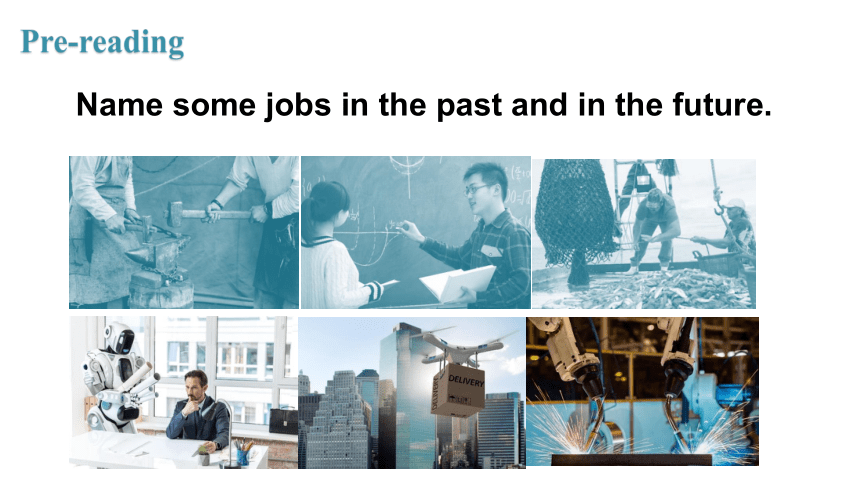





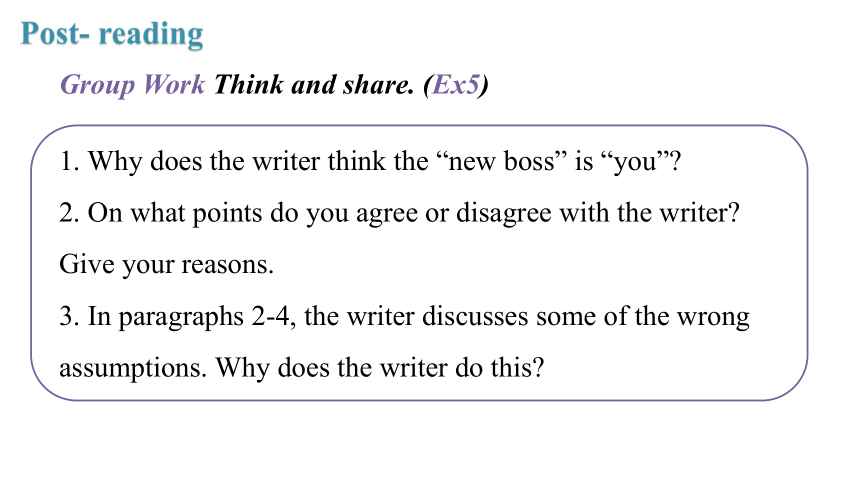
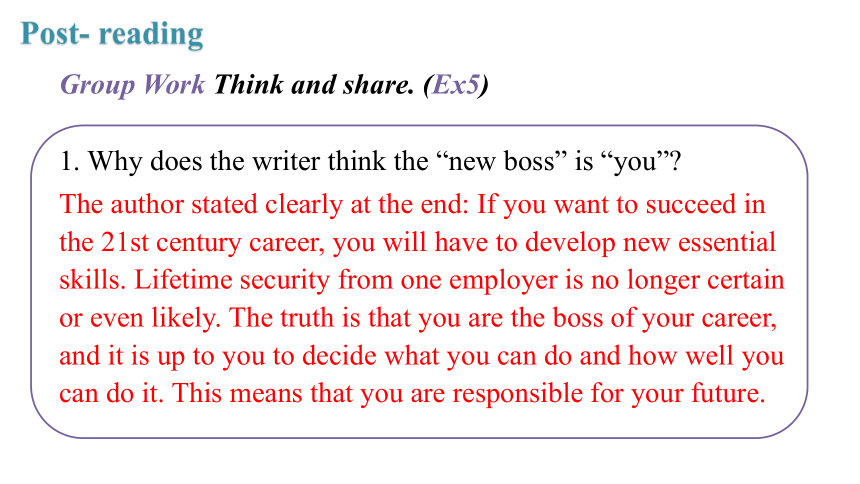
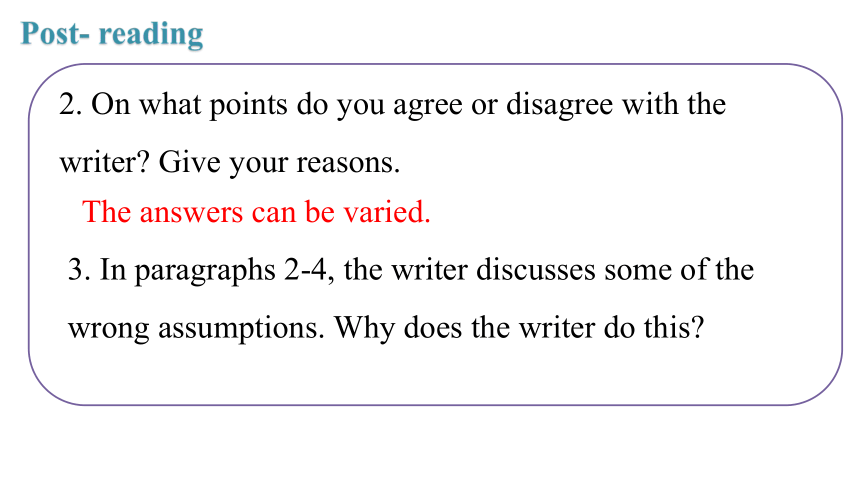
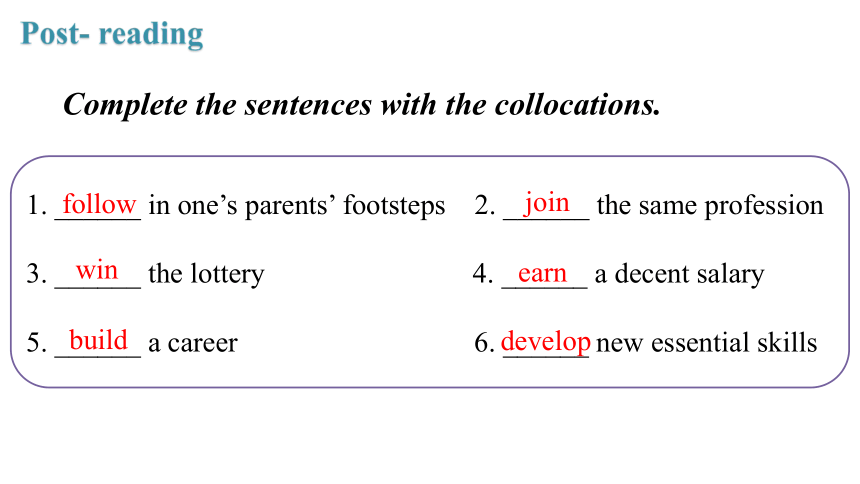

文档简介
(共38张PPT)
Unit 7 Careers
Lesson3 Meet The New Boss: You
Pre-reading
Name some jobs in the past and in the future.
Pre-reading
What do you think are the typical features of careers in the past What about in the future What may have caused the changes How can you get yourself prepared Use the phrases below to help you. (Ex1)
Ⅰ.阅读理解
( )1.From the passage we know the careers in the past are ________.
A.to follow in their parents’ footsteps
B.to be a risk taker
C.to develop new skills
D.to change their jobs frequently
( )2.If you want to become an expert or a specialist in something one day, you will need to be the followings EXCEPT ________.
A.a risk taker B.an innovator
C.a problem solver D.a casual worker
While-reading
A
D
( )3.Why can’t we work in the same field for our entire working life
A.Because our parents don’t allow it.
B.Because of the development of technology.
C.Because you want to take a risk.
D.Because you want to earn a decent salary
( )3.If you want to succeed in a 21st century career, you should ________.
A.do what your boss tell you to do
B.make your choices regularly
C.follow your parents’ footsteps
D.develop some new necessary skills
B
D
Pair Work Complete the information according to the article. Then talk in pairs about future careers based on the article.
Jobs in the past:
Wrong assumptions
Reasons
You should
Jobs in the future
How to succeed in a 21st century career:
Careful reading
wrong assumptions
Reasons
You should
working in the same field or industry for a long time
You can work eight hours a day and build a career.
You can’t be replaced by software, and your job can’t be outsourced to robots.
Technology will change.
It will not bring career success.
Jobs disappear.
stay up to date with technology
be prepared for developments and changes before you are thrown out of a career
Jobs in the future
Careful reading
Group Work Think and share. (Ex5)
1. Why does the writer think the “new boss” is “you”
2. On what points do you agree or disagree with the writer Give your reasons.
3. In paragraphs 2-4, the writer discusses some of the wrong assumptions. Why does the writer do this
Post- reading
Group Work Think and share. (Ex5)
1. Why does the writer think the “new boss” is “you”
The author stated clearly at the end: If you want to succeed in the 21st century career, you will have to develop new essential skills. Lifetime security from one employer is no longer certain
or even likely. The truth is that you are the boss of your career, and it is up to you to decide what you can do and how well you
can do it. This means that you are responsible for your future.
Post- reading
2. On what points do you agree or disagree with the writer Give your reasons.
The answers can be varied.
3. In paragraphs 2-4, the writer discusses some of the wrong assumptions. Why does the writer do this
Post- reading
1. ______ in one’s parents’ footsteps 2. ______ the same profession
3. ______ the lottery 4. ______ a decent salary
5. ______ a career 6. ______ new essential skills
follow
join
win
earn
build
develop
Post- reading
Complete the sentences with the collocations.
Recognising Irony
Writers sometimes use irony (sarcasm, exaggeration and humour). We can infer that he / she is not serious and wants to draw the readers’ attention.
e.g.:
Work hard
Win the lottery
Hope for the best
Skill Builder
Pair Work Tick ( ) the sentences that show irony. Then discuss your answers. Explain the examples of irony. (Ex7)
You might be lucky. These strategies might bring you a nice, comfortable life …
But most of us today have to look beyond the little box called “career”.
If you think you can work eight hours a day and build a career, think again.
If you think you can’t be replaced by software or your job can’t be outsourced to some robots on the moon, you are wrong.
√
√
√
Post- reading
◇词汇拓讲
1.retirement n. 退休,退职
(P14)In your grandparents’ time, there was the prospect of doing the same job from graduation until retirement.
retire v. 退休,退职;退却;离开
retire from… 从……退休/离职
The boxer retired from the contest with eye injuries.
retired adj. 退休的
2.occupation n. 工作,职业
(P15)Jobs and occupations come and go at an amazing pace these days.
【语言提升】
occupy v. 使用,占用;使忙于;忙着
be occupied (房间、座位、床位等)被占用;被占有
be occupied (in) doing sth. 忙于做某事
be occupied with sth. 从事/忙于某事.
3.intention n. 目的;意图
(Most people now have no intention of following in their parents’ footsteps or even staying at one job for very long.
have no intention of doing sth. 没打算做某事
with the intention of… 抱有……的目的/打算
intend vt. &vi. 打算,计划,想要
intend to do/doing sth. 打算/想要做某事
intend sb. to do sth. 计划让某人做某事
be intended for/to do… 旨在,预定……用途;为……打算的
4.be unlikely to不可能
(P15)The skills you have now are unlikely to remain relevant and be enough to help you through your entire career.
be likely/unlikely to do sth. 可能/不可能做某事
She is unlikely to leave next week.
It is likely+that从句 很有可能……
It’s likely that he will not agree.
5.up to取决于,由……决定; 多达;直到;能胜任
(P15)The truth is that you are the boss of your career, and it is up to you to decide what you can do and how well you can do it.
up to一词多义:
(1)(数量或数目)多达
(2)直到(某个时刻或日期) up to now直到现在
(3)能胜任 be up to the important job胜任这一重要工作
(4)正在做(秘密或不该做的事)
be up to writing a novel正在写小说
(5)由……决定;是某人的义务
be up to you 由你决定
It’s up to you what kind of life you will lead in the future.
It’s up to you to find out what your goals really are.
1.(P15)What if your job disappears after working for 10 years in the field
What if…? 常用来表示假设、建议、邀请、要求等,意为“倘若……将怎么样?”“如果……将会怎样?”
(1)“What if…?”后面经常跟一般现在时,有时根据语境可以跟虚拟语气。
What if a child has reading problems
What if the train is late
◇句式解读
(2)类似的表达还有:
How come?怎么会这样?/怎么搞的?
How /what about…?……怎么样?
So what 那又怎样?
Why not do sth. ?为什么不做某事?
征求对方对某事或某人的看法时还可用下列句型:
1.What do you think of…?
2.How do you like/find…?
3.What is/are…like
2.(P15)The truth is that you are the boss of your career, and it is up to you to decide what you can do and how well you can do it.
句中what引导的是宾语从句,且what在从句中作宾语。what除了引导宾语从句外,还可以引导主语从句或表语从句等。
eg:What impressed me most was the beauty of the city.
(what引导?从句)
Our teachers always tell us to believe in what we do and who we are if we want to succeed.
3.In your grandparents’ time, there was the prospect of doing the same job from graduation until retirement.
在你祖父母的时代,人们有可能从毕业到退休都做同样的工作。
解析:there be + the prospect of sth / of doing sth 有……可能性
graduation n 毕业 retirement n 退休
【例句观察】
1.Many people do not read them, because they think classics are old and boring and have nothing to do with life today.
2.They have not disappeared and still have a place in the world.
3.Nobody would bother to make these classic novels into films if they had nothing to do with contemporary life.
4.Readers may not be able to see the danger, so they need a symbol like the mist to make it clearer to them.
5.He has rigid ideas of what it means to be civil and to be a gentleman,and is embarrassed by Joe because he does not fit these.
□观察领悟
【我的领悟】
1.在所有例句中,画线部分构成句子的________形式。
2.例句1中的画线部分do not,例句2中的画线部分have not和例句5中的画线部分does not的构成特点是由________加________构成否定。
Keys:1.否定 2.助动词;not
3.例句4中的画线部分may not的构成特点是由________加________构成否定。
4.例句1中的________和例句3中的________, ______本身都表示否定意义。
Keys:3.情态动词;not
4.nothing;Nobody; nothing
□否定词和否定句
一、常用否定词
1.英语中否定含义的表达形式多种多样,可以用not,no,never,none,nobody,nothing,nowhere等否定词来表达否定之意。
We have not signed any agreement.
2.可以用hardly,scarcely,seldom,little,few等半否定词来表达否定之意。
Now she hardly had strength to open the carriage door.
3.可以用含否定意义的前缀de-,dis-,il-,im-,in-,ir-, non-,un-,under-等构成的词表达否定之意;也可以用后缀-less,-free,-proof等构成的词表达否定之意。
Today it is impossible to cure cancers completely.
4.其他表达否定意义的词组及固定搭配:far from远离;远非;完全不, rather than而不是, other than除了……之外, free from没有免于不受, would rather…than…等。
Your work is far from being satisfactory.
二、否定句
1.完全否定
no,not,never,none,nobody,nothing,nowhere,neither…nor结构均表示完全否定,在汉语中意为“绝对不”“没有”“远不(非)……”“一点也不”“根本不……”“无论如何也没有……”等.
None of my friends smokes.
The book is nowhere to be found.
2.部分否定
英语中一些含有总括含义的代词、形容词或副词,当用于否定句中时,只否定一部分,而不是完全否定。如all,everybody (everyone), everything, anyone (anybody), anything, anywhere, everywhere, always, quite, both, entirely, altogether等词与not连用时,译为“……不全是……”“不都是……”“并非全都是……”“不总是……”等。He is not absolutely wrong.
3.双重否定
使用双重否定时,表达的意义是肯定,即指同一句中有两处具有否定含义,但表达的意义是肯定的,通常比肯定句的语气要重。译成汉语时可以译成肯定形式,也可以保持双重否定形式。用于表示双重否定的词或结构有:no…not; no/not… without; never too…; cannot but do(不得不); cannot help doing; cannot help but do; without doubt; without fail; not seldom(常常); not displeased(满意的)等.
Nobody does nothing.人人都要做事。
。
4.某些结构表达否定意义
(1)too…to “太……而不能” He’s too small to do that.
(2)more A than B “与其B不如A”
more than+含有can的从句 “不能”
He is more brave than wise.他有勇无谋。
Your problem is more than I can deal with.你的问题我解决不了。
(3)比较级+than+不定式 “不至于做”
He was wiser than to have done such a thing.
他不至于愚蠢到做出这样的事情
5.连词before,unless等引导的状语从句可以表达否定意义
He slipped out before the meeting started.
会议还没开始,他就悄悄地溜出去了。
6.虚拟语气可以表达否定意义
But for your coming,I should have been very lonely.
要不是你来了,我会感到很寂寞的。
7.否定句的倒装结构为“否定词+助动词/情态动词+主语+其他”
Never have I been in the city.
我从未在那个城市待过。
Sentence Builder
Negative Expressions
unlikely to be have no intention of
not … anymore no longer hardly
1. Most people now ________________ following in their parents’ footsteps or even staying in one job for very long.
2. In fact, planning to work in the same field or industry for your entire working life just is ______ practical ________.
have no intention of
not
anymore
Prctice:Complete the Sentence Builder with the expressions. (Ex8)
Prctice:Complete the sentences with the expressions from the Sentence Builder. (Ex9)
1. High grades are _________ enough to guarantee success in a career.
2. Keeping the same job for life is ____ a realistic expectation ________.
3. The job you have today is ___________ the same as the job you’ll have in 20 years’ time.
no longer
not
anymore
unlikely to be
Summary: Negative expressions
unlikely to do sth 表示“不太可能做某事”
have no intention of doing sth 表示“某人或某组织没有做某事的意愿”
not … anymore 表示“不再”
no longer 表示“不再”
hardly 表示“几乎不”
Homework: Express yourself
Search online and find out what jobs have disappeared in the past 10 years. What new jobs do you think will appear in the next 10 years
Thank you
Unit 7 Careers
Lesson3 Meet The New Boss: You
Pre-reading
Name some jobs in the past and in the future.
Pre-reading
What do you think are the typical features of careers in the past What about in the future What may have caused the changes How can you get yourself prepared Use the phrases below to help you. (Ex1)
Ⅰ.阅读理解
( )1.From the passage we know the careers in the past are ________.
A.to follow in their parents’ footsteps
B.to be a risk taker
C.to develop new skills
D.to change their jobs frequently
( )2.If you want to become an expert or a specialist in something one day, you will need to be the followings EXCEPT ________.
A.a risk taker B.an innovator
C.a problem solver D.a casual worker
While-reading
A
D
( )3.Why can’t we work in the same field for our entire working life
A.Because our parents don’t allow it.
B.Because of the development of technology.
C.Because you want to take a risk.
D.Because you want to earn a decent salary
( )3.If you want to succeed in a 21st century career, you should ________.
A.do what your boss tell you to do
B.make your choices regularly
C.follow your parents’ footsteps
D.develop some new necessary skills
B
D
Pair Work Complete the information according to the article. Then talk in pairs about future careers based on the article.
Jobs in the past:
Wrong assumptions
Reasons
You should
Jobs in the future
How to succeed in a 21st century career:
Careful reading
wrong assumptions
Reasons
You should
working in the same field or industry for a long time
You can work eight hours a day and build a career.
You can’t be replaced by software, and your job can’t be outsourced to robots.
Technology will change.
It will not bring career success.
Jobs disappear.
stay up to date with technology
be prepared for developments and changes before you are thrown out of a career
Jobs in the future
Careful reading
Group Work Think and share. (Ex5)
1. Why does the writer think the “new boss” is “you”
2. On what points do you agree or disagree with the writer Give your reasons.
3. In paragraphs 2-4, the writer discusses some of the wrong assumptions. Why does the writer do this
Post- reading
Group Work Think and share. (Ex5)
1. Why does the writer think the “new boss” is “you”
The author stated clearly at the end: If you want to succeed in the 21st century career, you will have to develop new essential skills. Lifetime security from one employer is no longer certain
or even likely. The truth is that you are the boss of your career, and it is up to you to decide what you can do and how well you
can do it. This means that you are responsible for your future.
Post- reading
2. On what points do you agree or disagree with the writer Give your reasons.
The answers can be varied.
3. In paragraphs 2-4, the writer discusses some of the wrong assumptions. Why does the writer do this
Post- reading
1. ______ in one’s parents’ footsteps 2. ______ the same profession
3. ______ the lottery 4. ______ a decent salary
5. ______ a career 6. ______ new essential skills
follow
join
win
earn
build
develop
Post- reading
Complete the sentences with the collocations.
Recognising Irony
Writers sometimes use irony (sarcasm, exaggeration and humour). We can infer that he / she is not serious and wants to draw the readers’ attention.
e.g.:
Work hard
Win the lottery
Hope for the best
Skill Builder
Pair Work Tick ( ) the sentences that show irony. Then discuss your answers. Explain the examples of irony. (Ex7)
You might be lucky. These strategies might bring you a nice, comfortable life …
But most of us today have to look beyond the little box called “career”.
If you think you can work eight hours a day and build a career, think again.
If you think you can’t be replaced by software or your job can’t be outsourced to some robots on the moon, you are wrong.
√
√
√
Post- reading
◇词汇拓讲
1.retirement n. 退休,退职
(P14)In your grandparents’ time, there was the prospect of doing the same job from graduation until retirement.
retire v. 退休,退职;退却;离开
retire from… 从……退休/离职
The boxer retired from the contest with eye injuries.
retired adj. 退休的
2.occupation n. 工作,职业
(P15)Jobs and occupations come and go at an amazing pace these days.
【语言提升】
occupy v. 使用,占用;使忙于;忙着
be occupied (房间、座位、床位等)被占用;被占有
be occupied (in) doing sth. 忙于做某事
be occupied with sth. 从事/忙于某事.
3.intention n. 目的;意图
(Most people now have no intention of following in their parents’ footsteps or even staying at one job for very long.
have no intention of doing sth. 没打算做某事
with the intention of… 抱有……的目的/打算
intend vt. &vi. 打算,计划,想要
intend to do/doing sth. 打算/想要做某事
intend sb. to do sth. 计划让某人做某事
be intended for/to do… 旨在,预定……用途;为……打算的
4.be unlikely to不可能
(P15)The skills you have now are unlikely to remain relevant and be enough to help you through your entire career.
be likely/unlikely to do sth. 可能/不可能做某事
She is unlikely to leave next week.
It is likely+that从句 很有可能……
It’s likely that he will not agree.
5.up to取决于,由……决定; 多达;直到;能胜任
(P15)The truth is that you are the boss of your career, and it is up to you to decide what you can do and how well you can do it.
up to一词多义:
(1)(数量或数目)多达
(2)直到(某个时刻或日期) up to now直到现在
(3)能胜任 be up to the important job胜任这一重要工作
(4)正在做(秘密或不该做的事)
be up to writing a novel正在写小说
(5)由……决定;是某人的义务
be up to you 由你决定
It’s up to you what kind of life you will lead in the future.
It’s up to you to find out what your goals really are.
1.(P15)What if your job disappears after working for 10 years in the field
What if…? 常用来表示假设、建议、邀请、要求等,意为“倘若……将怎么样?”“如果……将会怎样?”
(1)“What if…?”后面经常跟一般现在时,有时根据语境可以跟虚拟语气。
What if a child has reading problems
What if the train is late
◇句式解读
(2)类似的表达还有:
How come?怎么会这样?/怎么搞的?
How /what about…?……怎么样?
So what 那又怎样?
Why not do sth. ?为什么不做某事?
征求对方对某事或某人的看法时还可用下列句型:
1.What do you think of…?
2.How do you like/find…?
3.What is/are…like
2.(P15)The truth is that you are the boss of your career, and it is up to you to decide what you can do and how well you can do it.
句中what引导的是宾语从句,且what在从句中作宾语。what除了引导宾语从句外,还可以引导主语从句或表语从句等。
eg:What impressed me most was the beauty of the city.
(what引导?从句)
Our teachers always tell us to believe in what we do and who we are if we want to succeed.
3.In your grandparents’ time, there was the prospect of doing the same job from graduation until retirement.
在你祖父母的时代,人们有可能从毕业到退休都做同样的工作。
解析:there be + the prospect of sth / of doing sth 有……可能性
graduation n 毕业 retirement n 退休
【例句观察】
1.Many people do not read them, because they think classics are old and boring and have nothing to do with life today.
2.They have not disappeared and still have a place in the world.
3.Nobody would bother to make these classic novels into films if they had nothing to do with contemporary life.
4.Readers may not be able to see the danger, so they need a symbol like the mist to make it clearer to them.
5.He has rigid ideas of what it means to be civil and to be a gentleman,and is embarrassed by Joe because he does not fit these.
□观察领悟
【我的领悟】
1.在所有例句中,画线部分构成句子的________形式。
2.例句1中的画线部分do not,例句2中的画线部分have not和例句5中的画线部分does not的构成特点是由________加________构成否定。
Keys:1.否定 2.助动词;not
3.例句4中的画线部分may not的构成特点是由________加________构成否定。
4.例句1中的________和例句3中的________, ______本身都表示否定意义。
Keys:3.情态动词;not
4.nothing;Nobody; nothing
□否定词和否定句
一、常用否定词
1.英语中否定含义的表达形式多种多样,可以用not,no,never,none,nobody,nothing,nowhere等否定词来表达否定之意。
We have not signed any agreement.
2.可以用hardly,scarcely,seldom,little,few等半否定词来表达否定之意。
Now she hardly had strength to open the carriage door.
3.可以用含否定意义的前缀de-,dis-,il-,im-,in-,ir-, non-,un-,under-等构成的词表达否定之意;也可以用后缀-less,-free,-proof等构成的词表达否定之意。
Today it is impossible to cure cancers completely.
4.其他表达否定意义的词组及固定搭配:far from远离;远非;完全不, rather than而不是, other than除了……之外, free from没有免于不受, would rather…than…等。
Your work is far from being satisfactory.
二、否定句
1.完全否定
no,not,never,none,nobody,nothing,nowhere,neither…nor结构均表示完全否定,在汉语中意为“绝对不”“没有”“远不(非)……”“一点也不”“根本不……”“无论如何也没有……”等.
None of my friends smokes.
The book is nowhere to be found.
2.部分否定
英语中一些含有总括含义的代词、形容词或副词,当用于否定句中时,只否定一部分,而不是完全否定。如all,everybody (everyone), everything, anyone (anybody), anything, anywhere, everywhere, always, quite, both, entirely, altogether等词与not连用时,译为“……不全是……”“不都是……”“并非全都是……”“不总是……”等。He is not absolutely wrong.
3.双重否定
使用双重否定时,表达的意义是肯定,即指同一句中有两处具有否定含义,但表达的意义是肯定的,通常比肯定句的语气要重。译成汉语时可以译成肯定形式,也可以保持双重否定形式。用于表示双重否定的词或结构有:no…not; no/not… without; never too…; cannot but do(不得不); cannot help doing; cannot help but do; without doubt; without fail; not seldom(常常); not displeased(满意的)等.
Nobody does nothing.人人都要做事。
。
4.某些结构表达否定意义
(1)too…to “太……而不能” He’s too small to do that.
(2)more A than B “与其B不如A”
more than+含有can的从句 “不能”
He is more brave than wise.他有勇无谋。
Your problem is more than I can deal with.你的问题我解决不了。
(3)比较级+than+不定式 “不至于做”
He was wiser than to have done such a thing.
他不至于愚蠢到做出这样的事情
5.连词before,unless等引导的状语从句可以表达否定意义
He slipped out before the meeting started.
会议还没开始,他就悄悄地溜出去了。
6.虚拟语气可以表达否定意义
But for your coming,I should have been very lonely.
要不是你来了,我会感到很寂寞的。
7.否定句的倒装结构为“否定词+助动词/情态动词+主语+其他”
Never have I been in the city.
我从未在那个城市待过。
Sentence Builder
Negative Expressions
unlikely to be have no intention of
not … anymore no longer hardly
1. Most people now ________________ following in their parents’ footsteps or even staying in one job for very long.
2. In fact, planning to work in the same field or industry for your entire working life just is ______ practical ________.
have no intention of
not
anymore
Prctice:Complete the Sentence Builder with the expressions. (Ex8)
Prctice:Complete the sentences with the expressions from the Sentence Builder. (Ex9)
1. High grades are _________ enough to guarantee success in a career.
2. Keeping the same job for life is ____ a realistic expectation ________.
3. The job you have today is ___________ the same as the job you’ll have in 20 years’ time.
no longer
not
anymore
unlikely to be
Summary: Negative expressions
unlikely to do sth 表示“不太可能做某事”
have no intention of doing sth 表示“某人或某组织没有做某事的意愿”
not … anymore 表示“不再”
no longer 表示“不再”
hardly 表示“几乎不”
Homework: Express yourself
Search online and find out what jobs have disappeared in the past 10 years. What new jobs do you think will appear in the next 10 years
Thank you
